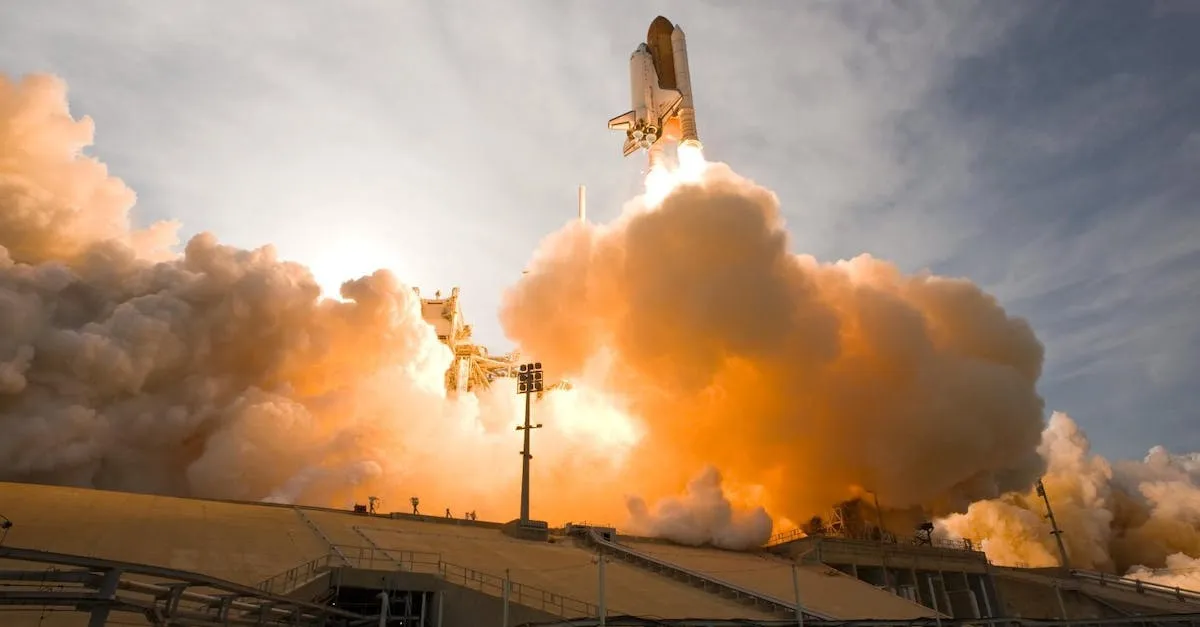Earning A Bachelor’S In Aerospace Engineering: What You Need To Know
For students fascinated by air and space travel, a Bachelor of Science (BS) in Aerospace Engineering is an exciting degree path to launch your career. Aerospace engineers design, build and test aircraft, spacecraft, satellites, and missiles.
If you’re short on time, here’s a quick overview: a BS in Aerospace Engineering combines rigorous technical coursework with hands-on projects. Students gain expertise in aerodynamics, propulsion, flight mechanics, systems engineering, and much more.
This comprehensive guide will explain aerospace engineering programs in detail, from required courses to career outlook, so you can determine if this challenging and rewarding field is the right choice for you.
Inside the Aerospace Engineering Curriculum
When pursuing a Bachelor’s degree in Aerospace Engineering, students can expect to encounter a rigorous curriculum that combines theoretical knowledge with practical skills. The program is designed to equip students with a solid foundation in math, physics, and engineering principles, while also focusing on specialized courses that are relevant to the field of aerospace engineering.
Typical Courses and Concepts
The aerospace engineering curriculum typically includes a variety of courses that cover a wide range of topics. Students can expect to study subjects such as aerodynamics, propulsion systems, flight mechanics, structures and materials, control systems, and space systems engineering.
These courses provide a comprehensive understanding of the fundamental principles and concepts that are essential for designing and building aircraft and spacecraft.
Additionally, students may also take courses in computer-aided design (CAD), computer programming, and numerical analysis, which are crucial skills in the field of aerospace engineering. These courses allow students to gain hands-on experience with industry-standard software and tools used in the design and analysis of aerospace systems.
Hands-On Learning Opportunities
A key component of the aerospace engineering curriculum is the emphasis on hands-on learning. Students often have the opportunity to participate in laboratory experiments, simulations, and design projects that simulate real-world challenges faced by aerospace engineers.
These practical experiences allow students to apply the concepts they have learned in the classroom and develop problem-solving skills that are essential in the field.
Furthermore, many aerospace engineering programs offer co-op or internship opportunities with industry partners, where students can gain invaluable industry experience while still in school. These experiences not only provide students with a chance to apply their knowledge in a professional setting but also enable them to build a network of industry contacts that can be beneficial for future career opportunities.
Senior Capstone Project
In their final year, aerospace engineering students typically undertake a senior capstone project. This project is a culmination of their academic journey and allows them to showcase their skills and knowledge in a practical and tangible way.
Students work in teams to design, build, and test a prototype aircraft or spacecraft, often with the guidance of faculty mentors and industry professionals. This project not only serves as a valuable learning experience but also demonstrates the students’ ability to apply their knowledge to solve complex engineering problems.
Important Skills and Qualities for Success
Strong Foundation in Math and Physics
A strong foundation in math and physics is crucial for success in a Bachelor’s in Aerospace Engineering. These subjects form the backbone of the field, providing the necessary tools and concepts to understand the complex principles of aerodynamics, propulsion, and celestial mechanics.
Proficiency in calculus, differential equations, and linear algebra is essential for solving equations and analyzing physical systems. Additionally, a solid understanding of physics, including topics such as mechanics, thermodynamics, and electromagnetism, is vital for designing and analyzing aerospace systems.
For more information on the importance of math and physics in aerospace engineering, you can visit NASA’s official website.
Creativity and Problem-Solving Skills
In addition to technical knowledge, creativity and problem-solving skills are highly valued in the field of aerospace engineering. Aerospace engineers are tasked with designing innovative solutions to complex problems, such as improving fuel efficiency, reducing noise levels, and enhancing aircraft performance.
Creativity allows engineers to think outside the box and come up with novel ideas, while problem-solving skills enable them to analyze, evaluate, and implement effective solutions. These skills are essential for tackling the challenges and advancements in the aerospace industry.
For inspiration on creative solutions in aerospace engineering, you can explore AIAA (American Institute of Aeronautics and Astronautics) for case studies and research papers.
Ability to Work in Teams
Aerospace engineering projects are rarely accomplished by individuals alone. Collaboration and teamwork are crucial for success in this field. Aerospace engineers often work in multidisciplinary teams, consisting of professionals from various backgrounds, such as mechanical engineering, electrical engineering, and computer science.
The ability to effectively communicate, delegate tasks, and work harmoniously with team members is essential for achieving project goals. Strong interpersonal skills and the ability to adapt to different working styles are highly valued in the aerospace industry.
To learn more about teamwork in aerospace engineering, you can visit SAE International, an organization that promotes collaboration and knowledge exchange among engineers in various disciplines.
Accreditation and Licensing for Aerospace Engineers
When pursuing a Bachelor’s degree in Aerospace Engineering, it is important to understand the significance of accreditation and licensing in this field. Accreditation ensures that the program meets certain quality standards and prepares students for successful careers in aerospace engineering.
Licensing, on the other hand, is a legal requirement for practicing as a professional engineer. Let’s take a closer look at both aspects.
Seeking ABET Accreditation
One of the most important considerations for aspiring aerospace engineers is to choose a program that is accredited by the Accreditation Board for Engineering and Technology (ABET). ABET accreditation serves as a mark of excellence and demonstrates that the program meets rigorous standards in terms of curriculum, faculty qualifications, and resources.
Students who graduate from an ABET-accredited program have a competitive edge in the job market and are eligible to pursue professional engineering licensure.
ABET accreditation ensures that aerospace engineering programs provide a solid foundation in core subjects such as mathematics, physics, mechanics, materials science, and aerodynamics. It also ensures that students have access to state-of-the-art facilities and hands-on learning experiences.
By attending an accredited program, students can be confident that they are receiving a high-quality education that is recognized by employers and professional organizations in the aerospace industry.
Obtaining a Professional Engineering License
After completing a Bachelor’s degree in Aerospace Engineering, many graduates choose to pursue licensure as a professional engineer (PE). Although licensure requirements vary by state or country, they typically involve a combination of education, work experience, and passing the Fundamentals of Engineering (FE) exam and the Professional Engineering (PE) exam.
Obtaining a PE license is not mandatory for all aerospace engineering positions, but it can provide numerous benefits. Licensed aerospace engineers have increased job prospects, higher earning potential, and greater opportunities for career advancement.
Additionally, a PE license demonstrates a commitment to professionalism, ethical standards, and public safety.
It is important for aspiring aerospace engineers to research the specific licensure requirements in their desired location and plan their education and career accordingly. The National Council of Examiners for Engineering and Surveying (NCEES) website is a valuable resource for detailed information on licensure requirements in different states and countries.
Aerospace Engineering Career Paths and Salaries
Common Jobs for Graduates
Graduates with a Bachelor’s degree in Aerospace Engineering have a wide range of career options available to them. Some of the most common jobs for graduates in this field include:
- Aerospace Engineer: These professionals work on the design, development, and testing of aircraft and spacecraft. They may specialize in a particular area, such as aerodynamics, propulsion, or avionics.
- Aircraft Systems Engineer: These engineers focus on the design and integration of various systems within an aircraft, such as electrical, hydraulic, and fuel systems.
- Aerospace Systems Analyst: These analysts use mathematical models and simulations to analyze and optimize the performance of aerospace systems.
- Aerospace Technician: Technicians in this field assist engineers in the design and testing of aerospace components and systems.
These are just a few examples of the many career paths available to graduates in Aerospace Engineering. The field offers a diverse range of opportunities for those with a passion for aviation and space exploration.
Top Employers in the Field
Several top companies and organizations hire Aerospace Engineering graduates. These employers value the technical expertise and problem-solving skills that these professionals bring to the table. Some of the top employers in the field include:
- Boeing: As one of the largest aerospace companies in the world, Boeing offers numerous opportunities for Aerospace Engineering graduates. They are involved in the design and manufacturing of commercial and military aircraft.
- Lockheed Martin: This global security and aerospace company is known for its advanced technology and innovation. They work on various projects, including military aircraft, space systems, and missiles.
- NASA: The National Aeronautics and Space Administration (NASA) is a prestigious employer for Aerospace Engineering graduates. They are involved in cutting-edge research and development in space exploration.
- SpaceX: Founded by Elon Musk, SpaceX is revolutionizing space technology with its ambitious projects, such as reusable rockets and plans for future space travel.
These are just a few examples of the top employers in the Aerospace Engineering field. There are many other companies, government agencies, and research institutions that offer exciting opportunities for graduates.
Earning and Growth Potential
Aerospace Engineering is a highly specialized field that offers competitive salaries and significant growth potential. According to the Bureau of Labor Statistics, the median annual wage for aerospace engineers was $116,500 as of May 2020.
The top 10% of earners in this field made more than $166,620 per year.
The earning potential for Aerospace Engineering graduates can vary depending on factors such as experience, education level, and location. Those with advanced degrees or additional certifications may have higher earning potential.
Additionally, the aerospace industry is constantly evolving and pushing the boundaries of technology. This creates exciting opportunities for career growth and advancement. As new technologies and innovations are developed, there will be a demand for skilled Aerospace Engineering professionals to drive progress in the field.
Conclusion
A Bachelor of Science in Aerospace Engineering opens the door to designing the future of flight and space exploration. The program provides rigorous technical knowledge combined with hands-on training.
If you are passionate about aeronautics and have strong math and science skills, an aerospace engineering degree can launch you on an exciting and rewarding career path.







